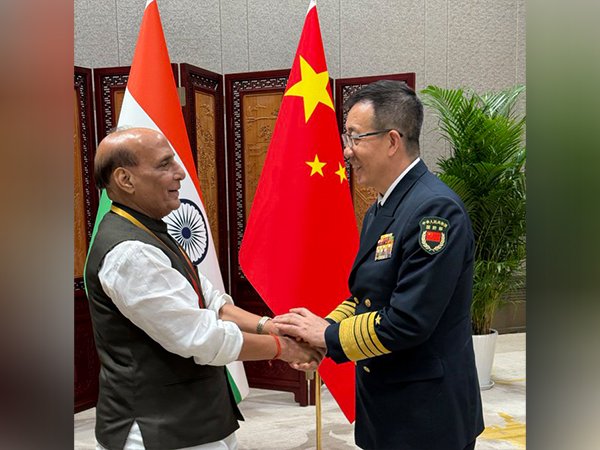On Thursday, Defence Minister Rajnath Singh held a high-stakes bilateral meeting with Chinese Defence Minister Admiral Dong Jun on the sidelines of the Shanghai Cooperation Organisation (SCO) Defence Ministers’ Meeting in Qingdao. This was India’s highest-level military engagement with China in recent months and focused on maintaining peace along the Line of Actual Control (LAC) and building a long-term framework for border stability.
Singh’s Four-Point Roadmap for India-China Peace
In a structured dialogue aimed at restoring and strengthening bilateral ties, Mr Singh proposed a four-point roadmap to de-escalate border tensions and rebuild mutual trust:
-
Strict Compliance with the 2024 Disengagement Agreement: Singh emphasized that both nations must fully adhere to the disengagement pact signed in October 2024, especially concerning the remaining friction points in Eastern Ladakh, namely Demchok and Depsang.
-
De-escalation Along the LAC: He urged both sides to continue working on de-escalation mechanisms to prevent any future conflict or accidental flare-ups in the sensitive border regions.
-
Accelerated Border Demarcation Process: Calling for the revival of existing frameworks, Mr Singh stressed the urgency of finalizing the demarcation and delimitation of the border. “There must be a permanent solution to border management,” he stated, highlighting the need to rejuvenate bilateral mechanisms focused on boundary resolution.
-
Bridging the Trust Deficit: The Defence Minister pointed to the lingering mistrust post-2020 Galwan clash, and called for fostering good-neighbourly relations to ensure shared stability across Asia and the globe.
This crucial meeting followed the October 2024 India-China disengagement agreement, which concluded the standoff at Demchok and the Depsang Plains. That agreement was a product of prolonged diplomatic and military dialogue, capped by a pivotal meeting between Prime Minister Narendra Modi and Chinese President Xi Jinping at the BRICS Summit in Kazan.
A Step Towards Normalcy: Kailash Mansarovar Yatra Resumes
Coinciding with the bilateral meeting was the resumption of the Kailash Mansarovar Yatra, suspended since 2020 due to the COVID-19 pandemic and prolonged border tensions. The reopening of this sacred pilgrimage route to the Tibet Autonomous Region is being seen as a symbolic step toward rebuilding confidence between the two nations.
Addressing Terrorism and Pakistan’s Role
Mr Singh did not limit the discussion to border issues with China. He raised strong concerns over cross-border terrorism from Pakistan, referencing the deadly April 22 terror attack in Pahalgam, Jammu & Kashmir, that claimed 26 innocent lives.
He briefed Admiral Dong Jun on Operation Sindoor, India’s ongoing counter-terror campaign aimed at dismantling terror infrastructure in Pakistan-occupied territories. Singh expressed India’s disappointment that the joint SCO Defence Ministers’ statement made no mention of terrorism or the Pahalgam attack. India sees this omission as a deliberate attempt to sideline the regional threat posed by terrorism.
In protest, Mr Singh refused to endorse the SCO joint declaration, especially since it controversially mentioned Balochistan—a reference India interpreted as a veiled accusation against its policies.
By pushing for border peace, insisting on counter-terrorism accountability, and rejecting a watered-down regional declaration, Defence Minister Rajnath Singh underscored India’s firm stance on sovereignty, security, and diplomatic integrity in the face of complex regional dynamics.



